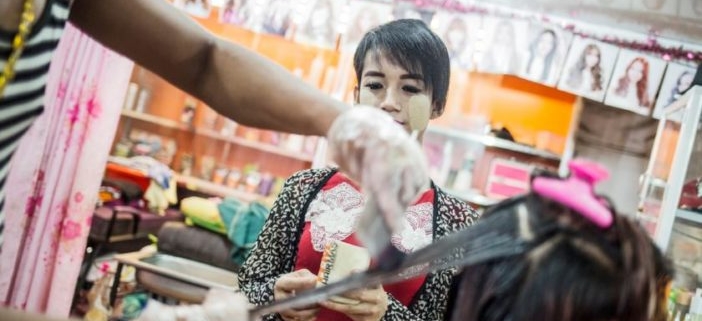Transwomen suffer most bias among LGBT: report
Transgender women experience the most discrimination of all LGBT (lesbian, gay, bisexual and transgender) people in Myanmar, according to a report released by a non-government group on Tuesday.
The two-page report, entitled “Baseline Assessment Report on Promotion of Human Rights and Rule of Law for LGBT Community in Yangon” also noted that while Myanmar society has become more tolerant of LGBT people, discrimination due to sexual orientation remains rampant.
Daw Nilar Myaing, research program manager of the project, said that police tend to arrest more transgender women (men who dress and behave like women but have yet to change their sex) in public places compared with other members of the LGBT community.
The study was conducted by Colors Rainbow, an NGO that advocates for the rights of the LGBT community. It was supported by FHI 360, an international non-government organisation that focused on improving lives of people, as well as the USAID, an agency of the US federal government that administers foreign aid and development assistance.
Daw Nilar Myaing, who works for the Sandhi Governance Institute, said transgender women, particularly sex workers, are often arrested by police under article 30(d) of the Rangoon Police Act, commonly known as the “darkness law”.
This leads transgender women not to report to the police if they are crime victims for fear of being ignored or abused by police officers, Daw Nilar Myaing said.
“They (transgender women) are arrested intentionally because police dislike them,” according to a transgender woman who attended the release of the report. “Police also target trans-women to fill their monthly quota.”
“There is a certain amount of crime cases per month that police officers must meet, sometimes they fill up their quotas by arresting transgender women,” she added. “Sometimes transgender women are arrested just to get bribes from them.”
She lamented that there is a low level of awareness among the LGBT community about their legal rights.
The report was based on a two-month survey conducted in six townships in Yangon: Shwe Pyi Thar, Hlaing Tharyar, North Okkalapa, Tarmwe, Thaketa and Thanlyin.
During the period the researchers also interviewed 51 LGBT people in the six townships. The researchers told The Myanmar Times that 76 percent of the transgender women they interviewed suffered discrimination from law enforcement officers.
Daw Khin Ma Ma Aye, executive director of Colors Rainbow, said her organisation plans to launch a project to help LGBT people learn more about their rights.
“Colors Rainbow plans to carry out projects to identify the needs of members of the community, especially the most vulnerable subgroups, so we can improve the services we provide them,” she said.
The report emphasised the need to promote the legal and human rights of the LGBT, especially the most vulnerable sub-groups.
It recommended a drop-in centre or a gathering place for members of the community as well as holding social events and developing strategies to promote their welfare.
The report noted the urgent need to provide members of the community knowledge of their rights and access to justice, as well as to push for amendment of laws that affect the LGBT community.
It called for raising awareness of the rights of the LGBT among the general public as well as legislators and policymakers.
The report calls for human rights training for officers of the Yangon Region Police Department to make them more aware of the rights of the LGBT as well as sensitive to their needs and concerns.



